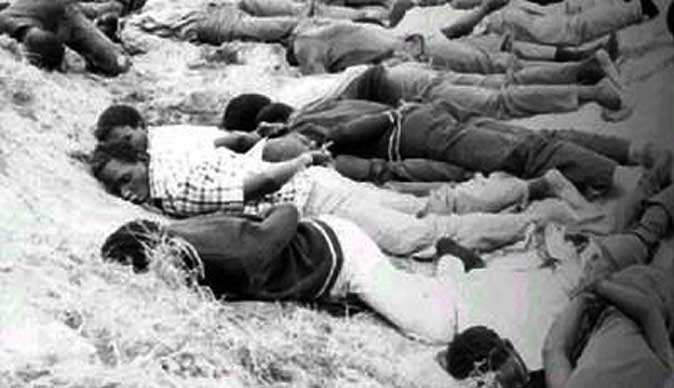
BULAWAYO police yesterday foiled a march to the High Court by Gukurahundi survivors who intended to petition for the setting up of a special commission to address the 1980’s mass killings. The march was supposed to start at Bulawayo City Hall car park ending at the High Court where the petition was to be delivered. The City Hall was, however, teeming with anti-riot police officers and others in plain clothes, forcing the organisers to abandon the march fearing arrest.
BY NQOBANI NDLOVU/SILAS NKALA
One of the organisers, Charles Thomas, a Gukurahundi victim and who was once charged with treason, confirmed the development yesterday.
“We wanted to hold a peaceful march to the High Court to petition the judiciary to set up an inquest into the Matabeleland massacres,” Thomas said.
Thomas was arrested and charged with treason in 2011 for allegedly distributing flyers in Bulawayo calling on Zimbabweans to revolt against government.
“Authorities seem to be against the march as seen by the massive presence of police details against defenceless victims who only want closure to the 1980’s disturbances,” he said yesterday.
Bulawayo police spokesperson Chief Inspector Precious Simango professed ignorance about the planned march in an interview with Southern Eye. The petition read in part, “We submit this petition for inquest into Gukurahundi genocide. As survivors of this genocide, we demand justice for families of survivors’ and victims… We also request compensation for us before we take this issue to international bodies.”
Last week Chief Maduna Mafu from Matabeleland also wrote to the United Nations (UN) seeking the setting up of an independent international body to probe the massacres. Government once initiated a probe into the Gukurahundi massacres, but the findings of the investigation were never made public.
- Chamisa under fire over US$120K donation
- Mavhunga puts DeMbare into Chibuku quarterfinals
- Pension funds bet on Cabora Bassa oilfields
- Councils defy govt fire tender directive
Keep Reading
President Emmerson Mnangagwa has said he was prepared to apologise if recommended by the National Peace and Reconciliation Commission (NPRC). Meanwhile, Chief Mafu has escalated his push for Gukurahundi resolution by writing to the Amnesty International after some unidentified people recently pounced on his home in Filabusi and allegedly harassed him following his petition to Mnangagwa to address the atrocities issue with urgency.
Chief Maduna also wrote to Mnangagwa asking him to speedily address the contentious issue which he said was the talk of everyone in Matabeleland and may boil to uncontrollable proportions if ignored for too long. In the letter to AI, the traditional leader requested protection against “harassment, imminent abduction, torture, kidnapping, forced disappearance, food poisoning and frivolous arrests” over his petition.
“The petition which went viral on social media has raised the ire of the current President who has responded by assigning a district central intelligence officer in the President’s office to place me under house arrest, that I report to him all my movements outside Filabusi and give him my itinerary thereof. This is done for an obvious reason to track my movements for purposes of either abduction or kidnapping or forced disappearance with well-known intention,” Maduna wrote.
The Amnesty International is yet to respond to his letter but the chief’s secretary said the letter was handed to the organisation’s offices in South Africa.







